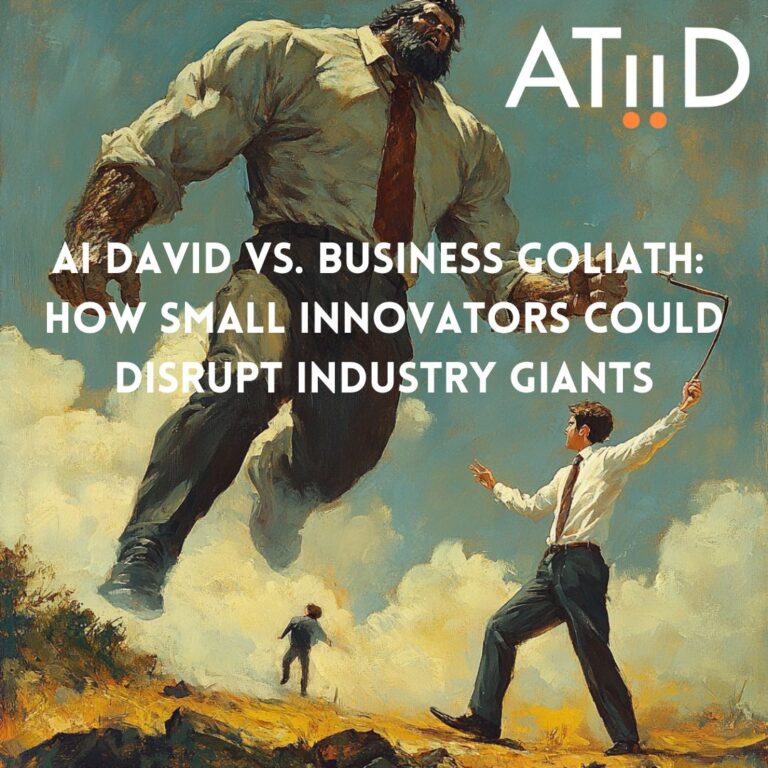AI David vs. Business Goliath: How Small Innovators Could Disrupt Industry Giants
In a fast-paced tech landscape, small startups will increasingly outmaneuvering large corporations. These nimble “Davids” will leverage AI and automation to develop innovative solutions, often becoming prime acquisition targets for the “Goliaths” of the business world. However, a growing trend shows these startups may choose to remain independent, scaling efficiently, and posing significant challenges to established industry leaders.

The Traditional Acquisition Model
Historically, large corporations have relied on acquiring startups to inject innovation into their portfolios. Encumbered by complex hierarchies and bureaucratic processes, these giants often struggle with in-house innovation. Startups, driven by creative entrepreneurs, develop cutting-edge technologies that larger companies find attractive to purchase and integrate. This strategy allows big firms to stay competitive without overhauling their internal structures.
However, this acquisition-driven approach can sometimes stifle innovation. When large firms indiscriminately acquire small ones, it might lead to more conventional, less radical, and less novel innovation. This is because the unique culture and agility of startups can be diluted within the larger corporate environment.
The Rise of Independent Innovators
Advancements in AI and automation will empower startups to build self-sustaining tech infrastructures requiring minimal human oversight. This autonomy will enable them to scale operations efficiently without the need for significant external investment or acquisition. As a result, many startup founders may opt to retain control, enjoying the fruits of their labor while maintaining the flexibility to innovate rapidly.
This shift is becoming evident in the increasing difficulty large corporations face when attempting to acquire successful startups. For instance, Discord, a communication platform, reportedly declined a $10 billion acquisition offer from Microsoft, signaling a trend where startups prefer independence over integration.
Collaborative Competition: Small Teams Taking on Giants
The collaborative potential among small, agile companies is reminiscent of strategies in modern space exploration. NASA, for example, is exploring the use of robotic swarms, small, cooperative modules working together to achieve complex tasks traditionally handled by larger, singular robots. This approach not only enhances efficiency but also offers greater flexibility and resilience.
Who Will Be Our Davids?
Starting a business has never been easy, and in today’s AI-driven world, success requires more than just a great idea. The new “Davids” will be those with vision, strategic thinking, and the ability to take action. These individuals won’t wait for permission; they’ll see a problem, leverage AI and automation, and create a solution faster than ever before. Unlike previous generations of entrepreneurs who needed large teams and significant capital, today’s innovators can scale efficiently with fewer resources, using AI to eliminate inefficiencies and automate operations.
To thrive in this new era, aspiring entrepreneurs should learn how to integrate AI into their workflows, think like strategists rather than task-doers, embrace collaboration, and stay ahead of industry trends. The future won’t belong to those who wait, it will belong to those who take bold action and redefine how businesses operate.
Shorter Giants, but Just as Mighty
Big corporations aren’t going anywhere, but the ones that adapt to a high-tech, AI-driven world will be the ones that thrive. To stay competitive, upgrading tech stacks isn’t enough, they also need well designed business processes, the right job structures, and employees skilled in coordinating AI-driven operations. The future isn’t about one massive system running everything, it’s about managing a network of smaller, specialized units, like a swarm of collaborative robots, all working together toward a bigger goal. This means businesses need flexible AI-integrated processes that make it easy to onboard new technologies, seamlessly integrate acquisitions, and maximize efficiency. Companies that build the right tech stack and train the right team to orchestrate this new way of working will be the ones that remain powerful, proving that agility, not just size, is the key to thriving in the modern business landscape.
The Battle Will Rage On
The business landscape is shifting, and those who adapt will be the ones who lead. The rise of AI, automation, and decentralized business structures is creating opportunities for small, highly skilled teams to compete with industry giants. But this doesn’t mean large corporations are doomed. The giants that update their tech stacks, refine their business processes, and build teams capable of managing a flexible, AI-driven ecosystem will remain just as powerful.
Success in this new era isn’t about sheer size, it’s about agility, innovation, and the ability to integrate and coordinate technology effectively. Whether you’re a startup founder building something disruptive or an enterprise leader looking to stay ahead, the key is creating a system that can evolve with technology, not struggle against it.
At ATiiD, we help businesses design AI-driven strategies that not only optimize today’s operations but also position them for future success. Whether you’re looking to build a scalable startup, integrate AI into your corporate structure, or future-proof your business processes, we’re here to help. Let’s build the future of business together. Contact us today.
